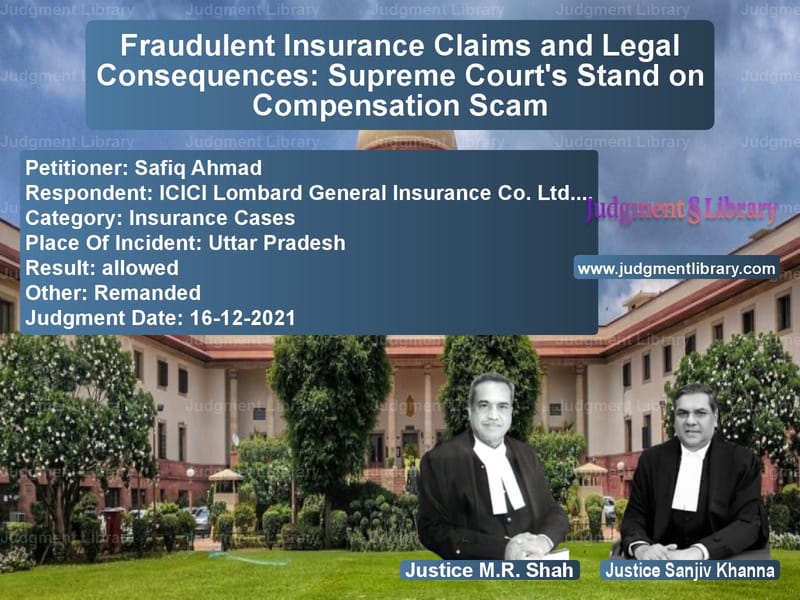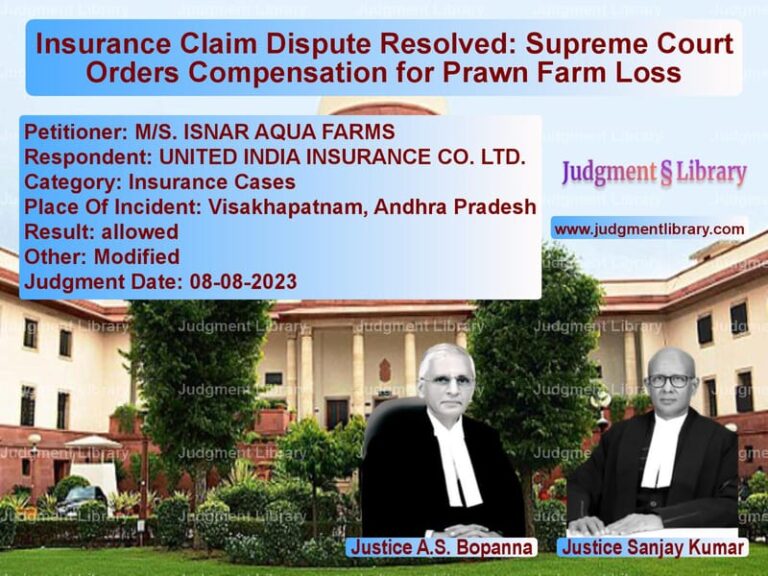Fraudulent Insurance Claims and Legal Consequences: Supreme Court’s Stand on Compensation Scam
The Supreme Court of India recently took up the critical issue of fraudulent insurance claims under the Motor Vehicles Act and the Workmen Compensation Act. The case, Safiq Ahmad vs. ICICI Lombard General Insurance Co. Ltd. & Others, highlights a well-coordinated scam where fake claim petitions were filed to fraudulently obtain compensation.
The case involved a massive investigation into 1376 suspicious claims across various districts in Uttar Pradesh, exposing the unethical practices of certain advocates, insurance agents, and claimants. The Special Investigating Team (SIT) uncovered systematic fraud, involving fabricated accidents, false witnesses, and manipulated documentation, which led to significant financial losses for insurance companies.
Background of the Case
In recent years, fraudulent claims under the Motor Vehicles Act and the Workmen Compensation Act have become a serious concern for the judiciary. Various cases have surfaced where non-road accident injuries or even natural deaths were manipulated to appear as road accidents, allowing claimants to receive undue compensation. This case particularly exposed a wide network of fraud, including lawyers, insurance officials, and fake claimants.
Petitioner’s Arguments
The petitioner, Safiq Ahmad, argued that claimants should be entitled to compensation under the law, and suspicion alone should not be a reason to reject claims. They contended that every case should be examined independently and due process should be followed before labeling claims as fraudulent. The petitioner also pointed out that delays in compensation proceedings negatively impact genuine victims.
Respondent’s Arguments
The respondents, including ICICI Lombard General Insurance Co. Ltd., countered that fraudulent claims had become a widespread issue requiring strict legal action. They presented concrete evidence showing how certain groups had manipulated accident reports to file fake claims. These fraudulent claims were causing substantial losses to insurance companies and leading to increased insurance premiums for genuine customers.
Key Findings from SIT Investigation
The SIT’s report exposed the shocking scale of fraud in insurance claims. Some of the most common fraudulent practices included:
- Fake Accidents: Accidents that never took place were falsely documented to claim compensation.
- Implantation of Vehicles: Insured vehicles that were never involved in accidents were fraudulently linked to claims.
- False Claimants: Multiple claims were filed across different jurisdictions for the same incident.
- Fabricated Documents: Fake medical reports and income certificates were submitted to inflate compensation.
- Lawyers’ Involvement: Some lawyers were found to be complicit in orchestrating fraudulent claims.
Supreme Court’s Observations
The Supreme Court took serious note of the SIT report and made the following observations:
“We appreciate the steps taken by the Bar Council of Uttar Pradesh, which shall ensure to maintain the purity of the legal profession in the State of Uttar Pradesh. We also impress upon the Bar Council of India/Bar Council of Uttar Pradesh to conclude the disciplinary proceedings in accordance with law as early as possible.”
The Court directed strict action against advocates found guilty of participating in fraudulent insurance claims. It also sought to impose stringent checks and balances in insurance claim processes.
Judicial Directives
The Supreme Court laid down important directives to tackle this widespread fraud:
- Accelerated Investigation: SIT was instructed to expedite inquiries into existing fraudulent cases.
- Legal Action Against Advocates: The Bar Council of Uttar Pradesh was directed to take strict disciplinary action against lawyers involved in fraudulent claims.
- Transparency in Claims Processing: The Court directed insurance companies to adopt stricter verification methods.
- Use of Technology: The Court proposed integrating accident claim data with government portals like VAHAN and SAARTHI to prevent duplicate claims.
Implications of the Judgment
This ruling has far-reaching implications for insurance law and legal ethics:
- Stronger Regulations: The judgment emphasizes the need for better oversight of accident claims.
- Impact on Legal Profession: Advocates involved in fraudulent claims face disbarment or legal action.
- Prevention of Insurance Frauds: Enhanced scrutiny and technological solutions will help curb fake claims.
The Supreme Court’s intervention marks a crucial step in tackling insurance fraud and ensuring that compensation reaches genuine victims rather than fraudulent claimants.
Petitioner Name: Safiq Ahmad.Respondent Name: ICICI Lombard General Insurance Co. Ltd. & Others.Judgment By: Justice M.R. Shah, Justice Sanjiv Khanna.Place Of Incident: Uttar Pradesh.Judgment Date: 16-12-2021.
Don’t miss out on the full details! Download the complete judgment in PDF format below and gain valuable insights instantly!
Download Judgment: safiq-ahmad-vs-icici-lombard-genera-supreme-court-of-india-judgment-dated-16-12-2021.pdf
Directly Download Judgment: Directly download this Judgment
See all petitions in Motor Insurance Settlements
See all petitions in Compensation Disputes
See all petitions in Legal Malpractice
See all petitions in Judgment by Mukeshkumar Rasikbhai Shah
See all petitions in Judgment by Sanjiv Khanna
See all petitions in allowed
See all petitions in Remanded
See all petitions in supreme court of India judgments December 2021
See all petitions in 2021 judgments
See all posts in Insurance Cases Category
See all allowed petitions in Insurance Cases Category
See all Dismissed petitions in Insurance Cases Category
See all partially allowed petitions in Insurance Cases Category







